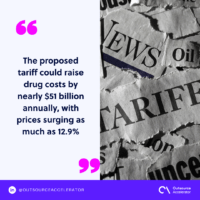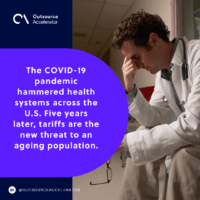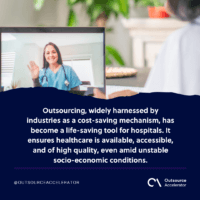A major blow
American health systems might look to cut staff to brace for the proposed 25% tariff on pharmaceutical imports — a move that could cripple overwhelmed hospitals.
The proposed tariff could raise drug costs by nearly $51 billion annually, with prices surging as much as 12.9%, according to a Pharmaceutical Research and Manufacturers of America report.
In 2023, some 73% of U.S. pharmaceutical imports worth $203 billion came from Europe, primarily Ireland, Germany, and Switzerland. Experts are worried that a spike in supply expenses, coupled with limited domestic manufacturing, could lead to pharmaceutical shortages.
Since U.S. hospitals must acquire these essential drugs to provide care, they would have to pass higher costs to insurers and patients through increased service charges. Some might even have to implement hiring freezes or reduce their headcount.
Essential tools
Shortages have been hampering operations in American hospitals since the pandemic. A massive exodus of physicians and nurses due to burnout and unfair wages has made the situation worse. A study reveals that hospital occupancy will exceed 85% by 2032. At this threshold, basic hospital operations can become “dysfunctional” and “unsafe.”
Shortages, which lead to poor healthcare delivery, go against the basic tenets of the healthcare industry. Hospitals should be able to provide top-notch care amid the continuous surge of patients. The COVID-19 pandemic hammered health systems across the U.S. Five years later, tariffs are the new threat to an ageing population.
The previous disaster prepared the U.S. healthcare industry for the upcoming one. With local nurses leaving the profession permanently, hospitals have turned offshore to continue providing care.
Offshore virtual nurses initially completed administrative tasks such as customer check-in, appointment scheduling, handling billing, and patient education. Major tech advances have empowered them to be more engaged in patient care. Several hospitals have equipped their suites with motion detector cameras to enhance patient safety and monitor activity. Laced with artificial intelligence, these cameras can read a patient’s vital signs, which greatly aids virtual nurses in ambient monitoring.
Outsourcing power
As the American health industry navigates its way around sweeping tariffs, sourcing offshore workers is a much-needed solution and respite. Will these tariffs be implemented? If so, will they be temporary or permanent?
Whatever the answer is, the healthcare industry must keep its expenses low and headcount healthy. Outsourcing, widely harnessed by industries as a cost-saving mechanism, has become a life-saving tool for hospitals. It ensures healthcare is available, accessible, and of high quality, even amid unstable socio-economic conditions.
Offshore nurses provide hospitals more financial wiggle room to afford essential drugs, which allows them to keep consumer costs relatively low and uphold the fundamental human right to health.
The question for your business
Are offshore workers part of your operations?




 Independent
Independent





















